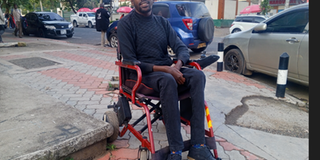Taking charge: How Nakuru is championing disability inclusion

Maina Karanja advocates for the inclusion of persons with disabilities in Nakuru.
Access to services for people with disability remains a major hurdle, with barriers ranging from inaccessible buildings to communication difficulties.
However, in Nakuru, organisations are now being empowered with the skills and knowledge to change this situation.
Through specialised Disability Inclusive Practices training, service providers and institutions are learning how to make their spaces and services more inclusive.
“Before, I didn’t know how to approach disability mainstreaming. Now, I feel equipped to improve accessibility and ensure our community is inclusive,” Isack Salaon, a trainee at Rift Valley National Polytechnic says.
He points to the ALOHA framework (Ask, Listen, Observe, Help, Ask Again) as a practical guide for offering support.
Mr Salaon states that issues such as the low attendance of students with disabilities at events often stem from poor planning, something he now feels confident addressing.
Maina Karanja, the founder of the Beyond Barriers Empowerment Network and someone who lives with motor neuron disease, says that the training is already having an impact across Nakuru.
He notes that organisations are not only gaining tools, but also engaging in honest conversations about how to break down stereotypes and serve wider communities.
“Creating safe spaces for dialogue is critical. Participants learn and share experiences, raising concerns which help institutions recognise how much more they can do,” Mr Karanja says.
He emphasises that disability inclusion is not just about accessibility, but also about accommodation and changing attitudes.
“The training helps organisations understand that people with disabilities do not want pity. They want support that empowers them to live independently,' he adds.
This effort is reinforced by the Persons with Disabilities Act of 2025, which requires a barrier-free environment. Public and private institutions are required to meet accessibility standards for buildings, transport, communication and service delivery.
Universal design features, such as ramps, demonstrate how inclusivity benefits everyone, including wheelchair users and elderly citizens who use walkers. The law also emphasises the importance of reasonable adjustments, such as installing grab bars, widening doorways, fitting roll-in showers and providing personal assistants.
By equipping service providers and institutions with the right knowledge, Nakuru is taking significant steps towards changing how organisations view disability, not as a limitation, but as part of human diversity.


